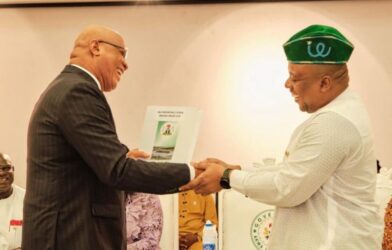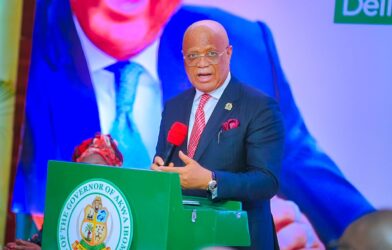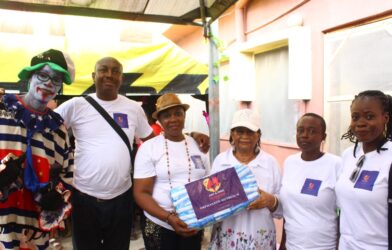150
The incidence of drug abuse is a clear and present danger in Nigeria. Tackling the drug menace requires all hands to be on the deck. The media ought to play a pivotal role in tackling the protracted drug problem.
The Mass Communication Department of Chukwuemeka Odumegwu Ojukwu University (COOU) led by Professor Angela Nwanmuo has led by example through collaborating with the National Drug Law Enforcement Agency (NDLEA) in holistically addressing the drug pandemic. The 2023 NDLEA/COOU Mass Comm National Conference with the theme, _”Drug Abuse and Drug Related Crimes in Contemporary Nigeria: Mass Media as Panacea”_ took place at TETFUND Auditorium, COOU Igbariam (New Site) from Tuesday, July 4 to Thursday, July 6, 2023.
Given the background that the government is playing a crucial part in smashing and arresting those responsible for the sale of hard drugs, it is incumbent on the media to drive the campaign through the critical roles of societal education and information.
The Chairman/Chief Executive Officer of NDLEA, Brig-General Mohamed Buba Marwa who had expressed a singular personal interest to attend the Igbariam conference was at the last minute held back by emergent official issues and therefore had to delegate Chigbu Odoemelam Chilee, a Deputy Commander of Narcotics and the Assistant Director, Research and Statistics, Drug Demand Directorate, to deliver his keynote address. The NDLEA boss expressed his profound gratitude and commendation to the Vice-Chancellor, the university management, the conference organizers, and the Department of Mass Communication COOU for their thoughtfulness and passion to rid the university community of the drug menace and for partnering with NDLEA.” The conference could not have come at a better time than now that the level of drug abuse in Nigeria has become quite alarming and worrisome especially among the youths.
According to the latest National Drug Use survey conducted by the United Nations Office on Drugs and Crime (UNODC), 14.3 million Nigerians aged between 15 and 64 years had used a psychoactive substance in the year for non-medical purposes, and about one in seven persons of the same 15-64 years age range had used a drug other than tobacco and alcohol. The study reveals the one out every four drug users in Nigeria is a woman. While drug use is common among people aged from 25 to 39 years, it is remarkable that one in five persons who had used drugs must be suffering from drug use disorder.
The commonest drug being abused in Nigeria happens to be cannabis which an estimated 10.6 million Nigerians use in a given year. The UNODC survey informs that the average age of initiation to cannabis use is 19 years. Incidentally, cannabis use is seven times higher among men than women. Additionally, an estimated 4.6 million Nigerians have used opiods such as tramadol, codeine or morphine for non-medical purposes. The non-medical use of cough syrups containing codeine and dextromethorphan is estimated at 2.4 million Nigerians.
There is the need for the media to play a critical role in educating the public on curbing factors contributing to substance abuse especially among the youth. The issue of peer pressure among the youth is a major cause of drug abuse among the youth. It is incumbent on the media to drive the enlightenment process.
The media will go a long way in aiding national development by highlighting and addressing the numerous negative consequences of drug addiction. The agenda-setting duty of the media will go a long way in dealing with drug-induced breakdown of the social fabric of the society. Anti-social behaviours linked to drug use including criminal acts such as cultism, robbery, gang rape etc. impel the media as the societal watchdog to be on top of.
It is the duty of the media to put forward the preventive strategies that are the most effective ways of addressing drug use. The intensification of drug education and awareness on the social and health consequences of drug use in the families, communities and institutions must serve as ongoing social services. The media must stress the need for the incorporation of drug education and astute parenting and life skills in the scheme of the fight for a drug-free Nigeria.
The media should be more responsible in the reportage of, for instance, the upsurge of the intake and inhaling of Crystal Meth (Mkpulu-mmili). It goes against the grain to somewhat lay undue emphasis on the actions of the drug addicts instead of laying emphasis on the deleterious effects.
The complexity of the drug menace in Nigeria is a national defect that the media must address with all seriousness. A convergence of multi-media approach is a sure strategy in sensitizing the youths against hard drugs.
The worry is that in this day and age of the social media acts of drug addiction tend to be promoted via the internet. The so-called Citizen Journalist armed with his computer, data and the internet has no controls. The drug malaise gets complicated when the social media influencers tend to actually promote drug use.
In the end, it takes the responsible mass media to serve as panacea to drug abuse and drug related crimes in contemporary Nigeria.
Paul Nwosu Is Commissioner For Information, Anambra State












Comments are closed